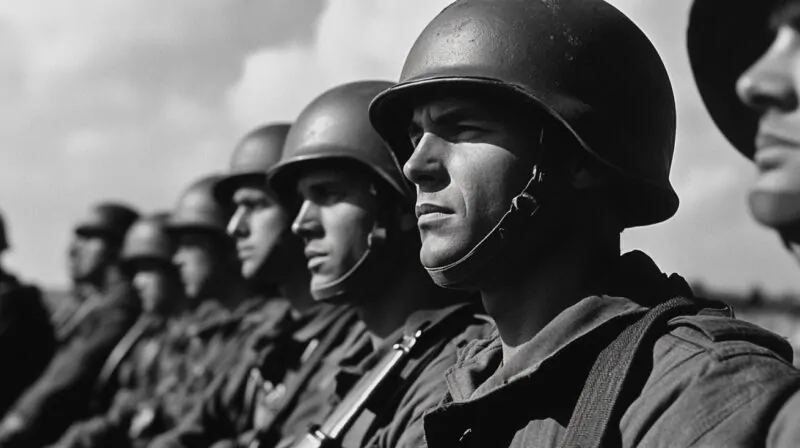Many assume that all military jobs require combat skills and physical endurance. However, modern military operations rely heavily on administrative, technical, and support roles that involve minimal physical exertion.
These positions are essential to keeping operations running smoothly and ensuring efficiency across various branches.
By focusing on clerical, financial, and logistical duties, service members in these roles contribute significantly to mission success without engaging in physically strenuous activities.
With that in mind, let us talk about the easiest military jobs that do not require physical work.
| Job Title | Annual Median Salary |
|---|---|
| Administrative Clerk | $49,565 |
| Accountant or Financial Manager | $68,326 |
| Cybersecurity Specialist (Cyber Warrior) | $91,000 |
| Dietitian | $76,000 |
| Public Affairs Specialist | $78,000 |
| Training Coordinator | $72,000 |
| Logistics or Supply Chain Specialist | $91,000 |
1. Administrative Clerk
Administrative clerks handle essential tasks that keep military offices running efficiently. The average salary for this position is $49,565 per year, according to Indeed.
- Accurate
- Organized
- Accessible

These clerks play a critical role in maintaining records, managing communications, and assisting officers and enlisted personnel with administrative needs.
- Processing and managing official military paperwork
- Handling internal and external communications, including emails, phone calls, and reports
- Maintaining personnel records, ensuring all documents are updated and properly stored
- Assisting in scheduling meetings, training sessions, and appointments
- Preparing reports, memos, and other written materials
- Managing databases and filing systems for quick and efficient retrieval of information
Why It’s an Easy Role:
- Minimal Physical Activity – Most work is done while seated at a desk or computer
- Predictable Routine – Tasks are structured, reducing unpredictability or high-pressure situations
- Standard Office Environment – Work is conducted in climate-controlled settings, away from physical hazards
- Limited Field Requirements – Unlike combat or tactical roles, administrative clerks rarely need to engage in physically demanding activities
Requirements for the Role:
- High school diploma or equivalent education
- Strong organizational and time-management skills
- Proficiency in office software such as Microsoft Word, Excel, and military database systems
- Attention to detail to prevent clerical errors and ensure accurate documentation
Since administrative duties are required in all branches of the military, there is a consistent demand for skilled clerks.
The role offers a stable work environment with opportunities for professional development, making it a solid career choice for those looking for structured and non-physical military service. It is one of the military jobs that can be described as one of the easiest.
2. Accountant or Financial Manager

Military financial specialists play a crucial role in managing budgets, processing payroll, and ensuring funds are allocated properly. A military accountant is a position that comes with a $68,326 yearly salary.
Their expertise helps prevent financial mismanagement while supporting military personnel by overseeing salary disbursements, allowances, and benefits.
Every branch of the military requires financial experts to maintain transparency and compliance with regulations.
- Managing and tracking military budgets to ensure proper fund allocation
- Processing payroll for enlisted personnel, officers, and civilian employees
- Ensuring timely and accurate disbursement of salaries, benefits, and bonuses
- Reviewing financial records to detect errors, fraud, or discrepancies
- Compiling and analyzing financial reports for military leadership
- Monitoring compliance with financial regulations and government policies
- Managing financial transactions, contracts, and procurement records
- Assisting in cost-cutting measures to optimize military spending
Why It’s an Easy Role:
- Office-Based Work – Accountants spend their time at a desk, working on financial reports and spreadsheets
- Minimal Physical Demands – No fieldwork or physical exertion is required for daily tasks
- Structured Routine – Most duties follow a predictable schedule, reducing job-related stress
- Secure Work Environment – Typically stationed in offices or finance departments with stable working conditions
Requirements for the Role:
- Bachelor’s degree in accounting, finance, or business administration
- Strong numerical skills and attention to detail to prevent financial errors
- Proficiency in financial software and spreadsheet applications (such as Excel or military-specific accounting systems)
- Knowledge of military financial regulations and policies, acquired through specialized training
- Strong analytical and problem-solving skills to handle complex financial scenarios
- Ability to maintain confidentiality when handling sensitive financial data
Since financial operations are a critical part of military administration, accountants and financial managers enjoy steady job availability and career advancement opportunities. The position allows for professional growth while avoiding the physically demanding aspects of military service.
3. Cybersecurity Specialist (Cyber Warrior)

Cybersecurity specialists play a vital role in protecting military networks, preventing cyber threats, and ensuring the integrity of classified information. According to Glassdoor, US army cybersecurity specialist’s annual salary is $91,000.
These military jobs require professionals who will be responsible for defending against digital attacks that could compromise national security.
- Monitoring military networks for unauthorized access, malware, and potential breaches
- Conducting vulnerability assessments to identify security weaknesses in military systems
- Developing and implementing security protocols to strengthen cyber defenses
- Responding to cyber incidents, investigating threats, and mitigating attacks in real-time
- Encrypting sensitive military data and ensuring compliance with security policies
- Collaborating with intelligence agencies to track cyber threats and potential adversaries
Why It’s an Easy Role:
- No Physical Labor – Work is performed entirely on computers in secure locations
- Predictable Work Environment – Tasks involve monitoring systems, analyzing threats, and executing preventive measures
- Intellectually Engaging – Cyber threats evolve constantly, making the role challenging without requiring physical strain
- High Demand for Skills – Cybersecurity expertise is valued across all branches, increasing job security and opportunities for advancement
Requirements for the Role:
- A degree in information technology, cybersecurity, or computer science
- Industry certifications such as CompTIA Security+, Certified Information Systems Security Professional (CISSP), or Certified Ethical Hacker (CEH)
- Strong analytical and problem-solving skills for identifying and addressing security risks
- Knowledge of encryption methods, firewalls, and intrusion detection systems
- Familiarity with programming languages such as Python, Java, or C++ for security automation
This is one of the military jobs that are ideal for individuals who enjoy working in technology-driven environments.
Since cybersecurity is a top priority for modern military operations, skilled professionals in this field can expect stable career prospects with opportunities for specialization and advancement.
4. Dietitian

Military dietitians play a key role in ensuring service members receive proper nutrition to support their physical health, mental sharpness, and overall well-being.
They analyze dietary needs, create meal plans, and provide guidance on nutritional best practices tailored to the demands of military life.
- Assessing the dietary needs of military personnel based on physical requirements, medical conditions, and operational demands
- Developing meal plans that align with nutritional guidelines set by the military
- Educating service members on proper nutrition, hydration, and dietary choices to enhance performance
- Advising military chefs and food service personnel on ingredient selection, portion sizes, and meal preparation techniques
- Evaluating and improving food service programs to ensure they meet health and safety standards
- Working with military healthcare providers to address nutrition-related health concerns
Why It’s an Easy Role:
- Minimal Physical Exertion – Most responsibilities involve consultations, planning, and research rather than physically intensive tasks
- Structured Environment – Work is primarily conducted in medical offices, military hospitals, or administrative facilities
- Limited Fieldwork – Occasional visits to dining halls or kitchen facilities, but no requirement for outdoor physical activities
- Predictable Work Schedule – Unlike combat roles, dietitians follow routine office hours with minimal disruptions
Requirements for the Role:
- A degree in nutrition, dietetics, or a related field
- Completion of military health and wellness training programs
- Strong communication skills for educating service members on dietary improvements
- Knowledge of food safety regulations and military nutrition policies
The role provides a stable and rewarding career path for those passionate about health and wellness. The annual salary for this position is $76,000.
Dietitians make a significant impact on the well-being of military personnel while working in a low-stress, structured environment.
5. Public Affairs Specialist

Public affairs specialists handle military communications with the public, media, and service members.
They ensure information is conveyed clearly and accurately, shaping public perception and maintaining transparency.
Their work strengthens relationships between the military and the communities it serves.
- Writing and distributing press releases to keep the public informed about military activities
- Preparing speeches for military leaders and spokespersons
- Coordinating interviews between military personnel and media outlets
- Managing official military social media accounts and engagement strategies
- Developing content for internal newsletters, websites, and publications
- Organizing press conferences, public events, and community outreach initiatives
- Responding to media inquiries and providing accurate statements
- Ensuring military policies and messaging align with public relations strategies
Why It’s an Easy Role:
- Minimal Physical Activity – The job consists mostly of writing, editing, and media coordination
- Office-Based Work Environment – Tasks are performed in an office or media center, often with access to modern communication tools
- Predictable Schedule – While deadlines must be met, the work follows a structured routine with minimal unexpected physical demands
- Focus on Communication Skills – Success in this role depends on writing and media relations rather than physical endurance
Requirements for the Role:
- Bachelor’s degree in public relations, journalism, communications, or a related field
- Strong writing and editing skills to create press releases and reports
- Familiarity with media relations and public speaking
- Ability to manage multiple communication channels, including social media
- Understanding of military policies and the ability to translate them into public-friendly messaging
- Experience with event planning and coordination is beneficial
Public affairs specialists play a crucial role in maintaining the military’s reputation and public trust. Of course, this is not an effortless job, and that is why the position comes with an annual median salary of $78,000.
They ensure information is shared effectively, helping bridge the gap between the armed forces and the general public while working in a professional and structured setting.
6. Training Coordinator

Training coordinators are responsible for organizing and managing training programs for military personnel. The median salary for this position is $72,000.
Their work ensures that service members receive the necessary instruction to perform their duties effectively.
By handling administrative and logistical aspects, they support skill development across different military fields without engaging in physical training themselves.
- Developing and maintaining training schedules to ensure timely instruction
- Coordinating with instructors, subject matter experts, and leadership to align training objectives with operational goals
- Organizing and distributing instructional materials, including manuals, presentations, and digital resources
- Managing logistics for training sessions, such as booking classrooms, securing training equipment, and arranging accommodations if necessary
- Tracking progress and attendance of personnel undergoing training
- Reviewing feedback and performance evaluations to enhance training programs
Why It’s an Easy Role:
- Minimal Physical Demand – Primarily office-based, requiring only occasional meetings or briefings
- Structured Work Routine – Daily tasks revolve around scheduling, coordination, and documentation
- No Direct Training Involvement – Coordinators facilitate programs but do not physically conduct drills or field exercises
- Predictable Workload – Unlike combat roles, responsibilities are stable and follow planned training cycles
Requirements for the Role:
- Degree in human resources, business administration, or training management (or equivalent military experience)
- Strong organizational and time-management skills to handle multiple training programs at once
- Attention to detail to track training records and ensure accuracy in documentation
- Ability to work with different military departments and personnel to coordinate training needs
Since military training is a continuous process, training coordinators play an important role in keeping personnel updated on new policies, procedures, and skills.
The position offers a structured environment with opportunities for career growth while avoiding physically demanding work.
7. Logistics or Supply Chain Specialist

Logistics specialists are responsible for ensuring that military units receive the supplies and equipment they need to function effectively. The median salary for this position is $91,000.
They oversee inventory, coordinate shipments, and manage the movement, via trucks or planes, of essential resources.
Their work ensures that personnel in both combat and non-combat roles have access to food, medical supplies, fuel, ammunition, and other necessities.
- Monitoring and maintaining inventory levels to prevent shortages or overstocking
- Coordinating the shipment and distribution of military supplies to bases and operational sites
- Overseeing procurement processes to acquire necessary equipment and materials
- Managing supply chain databases to track inventory movement and availability
- Collaborating with vendors, suppliers, and transportation units to ensure timely deliveries
- Conducting cost analysis and budget planning for supply and logistics operations
Why It’s a Low-Physical-Demand Role:
- Strategy-Based Work – Responsibilities focus on planning and coordination rather than manual labor
- Office and Warehouse Management – Most tasks involve working with databases and software instead of handling equipment
- Minimal Fieldwork – While some site visits may be required, logistics specialists do not perform physically demanding duties
- Technology-Driven Processes – Supply tracking and inventory management rely heavily on automated systems, reducing the need for physical exertion
Requirements for the Role:
- Degree in logistics, supply chain management, business administration, or a related field
- Strong analytical and problem-solving skills to manage inventory and distribution effectively
- Proficiency in supply chain management software and military logistics databases
- Attention to detail to prevent errors in tracking and ordering supplies
- Organizational skills to coordinate multiple shipments, inventory levels, and supplier relationships
Since logistics operations are critical to military readiness, specialists in this field play an essential role in ensuring smooth and efficient supply chain functions.
It is one of the military jobs that offers a structured work environment, career advancement opportunities, and stable employment in both active duty and civilian military support positions.
The Bottom Line
Many military jobs involve minimal physical demands while still playing a vital role in operations.
Administrative, financial, cyber, and logistics positions ensure efficiency and readiness without requiring physical exertion.
Military jobs provide structured work environments, clear career paths, and opportunities for professional growth.
Those interested in serving while avoiding physically intense tasks can easily find high-demand military occupations!
Sources
- Indeed – Administrative Clerk yearly salaries in the United States at U.S. Army
- Zip Recruiter – Military Accountant Salary
- Glassdoor – US Army Cyber Security Salary
- Zip Recruiter – Military Dietitian Salary
- Glassdoor – US Army Public Affairs Specialist
- Glassdoor – Military Education Coordinator Salary
- Glassdoor – US Army Logistics and Supply Chain Coordinator







